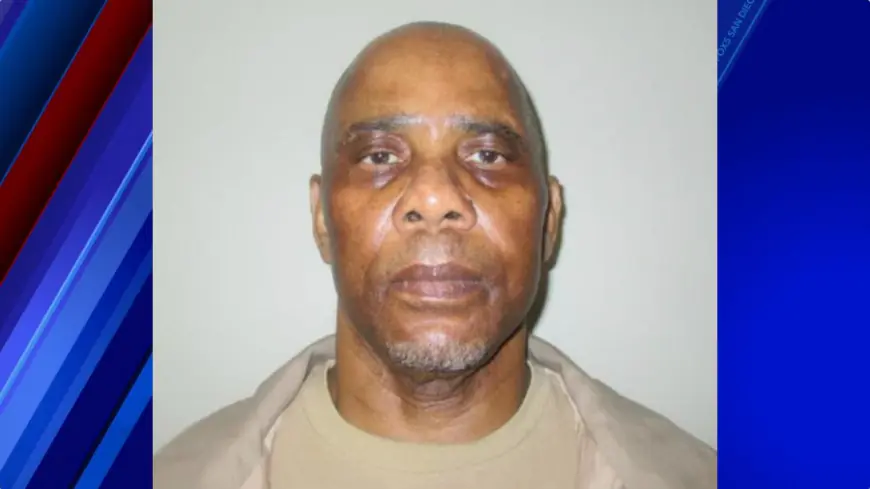Sexually violent predator granted 'transient release' by court
A sexually violent predator could soon be released in San Diego County, but instead of being placed in a designated home, he is set to be released on a transient basis.

SAN DIEGO (FOX 5/KUSI) — A sexually violent predator could soon be released in San Diego County, but instead of being placed in a designated home, he is set to be released on a transient basis.
Merle Wakefield, 67, was granted a transient release by a San Diego judge on Monday. Wakefield has a history of violent crimes, including rape by force and lewd acts with a child.
This is the third time the California Department of Hospitals has attempted to place him in San Diego County.
Poway residents rallied against Wakefield’s release into their city in July, protesting his proposed placement in a house near a school and park. Poway Mayor Steve Vaus, who led the opposition, expressed concern about Wakefield’s proximity to community spaces.
“Poway is the safest city in the county, and we want to keep it that way,” Vaus said. “To have this guy a mile up the road from a school, a park — it made no sense.”
A hearing to finalize Wakefield's release is set for Nov. 20. During the hearing, Liberty Healthcare, the state contractor who manages and monitors the release of sexually violent predators like Wakefield, is expected to present a plan for his supervision.
Vaus criticized the transient release, calling it a dangerous gamble with public safety.
“They are going to be asking the public to play whack-a-mole with a dangerous criminal,” Vaus said. “It’s a shell game that puts a community at risk.”
The San Diego County District Attorney’s Office opposed Wakefield’s transient release, calling it a significant risk to the community due to limited monitoring and supervision.
In a statement, Tanya Sierra, a spokesperson for the district attorney's office, stressed the importance of finding suitable housing where convicted offenders like Wakefield can be closely monitored.
"It is incumbent upon the Department of State Hospitals and their contractor, Liberty Healthcare, to find suitable housing for all Sexually Violent Predators who have been ordered conditionally released where they can be closely monitored and supervised," Sierra said. "We will continue to oppose transient releases and will insist that Department of State Hospitals fulfill their duty to find suitable fixed placement.”
State Senate Minority Leader Brian Jones, who represents California's 40th senatorial district, also voiced concerns with the court's decision. He noted Wakefield may end up on the streets or temporarily housed in a hotel at taxpayer expense.
“Now he is just left to the wind to go fend for himself,” Jones said. “Supposedly, he’s going to have a tracking device.”
Jones called for an audit of the California's sexually violent predator program earlier this year, the findings of which were released last week.
According to the report, the program has seen a high number of offenders violate the terms of their release — about 36%.
The program over the last 20 years has also been expensive for its scope, the audit says, with Liberty Healthcare receiving about $93 million to manage just 56 individuals.
“It costs us $450,000 to $500,000 a year to house these sexually violent predators in our communities rather than keeping them in state hospitals, where they belong,” Jones said.
Vaus echoed the sentiment, arguing that while some sexually violent predators may deserve release from prison, they should not be allowed to live on their own without strict supervision.
“Maybe they deserve to be outside the prison walls, but I don’t believe they deserve to be outside the prison fences,” Vaus said.
In a statement, the California Department of Hospitals pushed back on this, saying the state Supreme Court has held the law allowing for civil commitment of sexually violent predators is considered constitutional as it "was designed to ensure that an SVP committed individual has the opportunity to be conditionally released from confinement."
Should his placement be finalized, the district attorney's office confirmed that wherever Wakefield resides, the court order requires him to be under 24-hour in-person supervision.
The Department of Hospitals added it is ultimately the court's decision whether an individual designated as a sexually violent predator can be released, and that they will not do so until it is determined it is "safe and appropriate to do so."
In concert with Liberty Healthcare, the released sexually violent predators are placed under close supervision, such as unannounced home visits, covert surveillance and GPS monitoring among other things, as they continue treatment.
"The close supervision is there to guard against the individual committing any new crimes. Any failure to follow the rules regarding treatment, drug screening, surveillance, and examinations may result in a return to a state hospital," the department continued.
FOX 5/KUSI's Danielle Dawson contributed to this report.
What's Your Reaction?









































































































